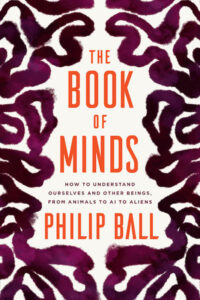 Just before going out the door the other day, I stopped to take a volume Oxford University Press’ Very Short Introductions series – the volume Elements by Phillip Ball, as chance would have it on this occasion – down from the bookshelf and place it in my pocket, as I do whenever I’m faced with the possibility of finding myself away from home with the potential for needing to occupy time whilst waiting in a queue, lobby, or other situation where a few pages of an edifying book could be read. Little did I know that that very day a copy of Mr. Ball’s most recently published book, The Book of Minds; How to Understand Ourselves and Other Beings, from Animals to AI to Aliens would find its way to my desk the very next day.
Just before going out the door the other day, I stopped to take a volume Oxford University Press’ Very Short Introductions series – the volume Elements by Phillip Ball, as chance would have it on this occasion – down from the bookshelf and place it in my pocket, as I do whenever I’m faced with the possibility of finding myself away from home with the potential for needing to occupy time whilst waiting in a queue, lobby, or other situation where a few pages of an edifying book could be read. Little did I know that that very day a copy of Mr. Ball’s most recently published book, The Book of Minds; How to Understand Ourselves and Other Beings, from Animals to AI to Aliens would find its way to my desk the very next day.
Examining the idea of “mind” as it does or may exist in a wide range of forms from biological to artificial, Mr. Ball envisions a “space of possible minds” through which he can lead his readers in consideration of a number of questions pertaining to minds that doesn’t privilege the human one. Included in these questions are ones pertaining to non-human animal cognition, the rights of non-human animals, the significance of AI on human society, the potential for communication with extra-terrestrial beings, and even such philosophical heavyweights as what consciousness is, and for that matter, “what (if anything) is free will?”
To be sure, The Book of Minds is not exactly a “light read.” However if Mr. Ball’s previous books, such as the aforementioned Elements, Invisible; The Dangerous Allure of the Unseen, and Curiosity; How Science Became Interested in Everything are indications by which to make assumptions (and I think they are), then this most recent one may be expected to prove very informative and thought-provoking indeed.
